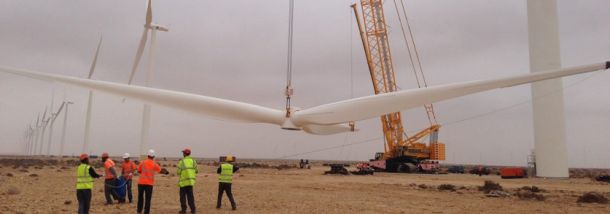
Morocco and Siemens press on with their plans to generate energy in the human rights black-spot that is Western Sahara: the first controversial wind farm near Boujdour is expected to be operational in December 2018, built by a UK company.
In a press release of 5 October 2017, Windhoist, a turbine erection company based in the UK, states it is "delighted to be returning to Morocco". "On this occasion, Windhoist will be erecting 56 Siemens 3.6-130 x 100mhh wind turbines at the Aftissat Wind Farm which is 45km South of Boujdour in the Western Sahara", the press release continues. "The $391m wind farm is being developed for Société Energie Eolienne du Maroc (EEM) who will use the impressive 201.6MW of energy to supply industrial companies in Morocco".
The release does not mention that the location is actually not in Morocco at all. The part of Western Sahara where the UK company is constructing the mills is under illegal occupation by Morocco. The release also does not mention that their partner EEM is controlled by the Moroccan royal family.
The 200 MW Aftissat wind farm is expected to be fully functioning in December 2018.
In December 2016, Nareva announced that it had secured the necessary funding for the Aftissat wind farm: a total investment of 4 billion Moroccan Dirham (about €370 million) will be coughed up by EEM shareholders and through bank loans by a consortium of Moroccan banks.
As hinted in the Windhoist press release, the power generated at Aftissat is destined for large industrial users. In a statement circulated by Nareva in December 2016 and widely picked up in Moroccan media, specific companies are mentioned: LafargeHolcim Maroc, OCP, Ciments du Maroc, Sonasid, Managem, la Snep and Air Liquide Maroc all appear in the list of industrial clients of the wind farm. The three former have controversial operations in the occupied territory.
The Aftissat wind park is not the only wind park in the vicinity of the coastal town of Boujdour. In March 2016, the Moroccan state agency for electricity ONEE officially announced that Siemens - in grouping with Italy's Enel Green Power and Nareva, owned by the king of Morocco - had been awarded a $1.2 billion contract to install 850 MW of wind turbines over five wind farms in Morocco. Only, two out of the five envisioned farms would in fact be located in occupied Western Sahara: a 300 MW farm in Tiskrad, near El Aaiun, and a 100 MW farm near Boujdour. That farm is expected to be operational in 2020. Western Sahara Resource Watch on 2 November 2016 published a report regarding the overall renewable energy programmes by Morocco in the occupied territory. The report mentioned that more than a quarter of all Moroccan renewable energy will be produced on occupied land by 2020. The Aftissat project was not mentioned in that report or part of that calculation.
Siemens has on 11 October 2017 inaugurated its blade factory in Tanger, north of Morocco proper. The blade factory is part of the arrangements under the large contract for installing 850 MW of wind turbines. One of the factory's first clients is the 200 MW Aftissat wind farm.
The Court of Justice of the EU on 21 December 2016 stated that Western Sahara is a "separate and distinct" territory from Morocco, and judged that trade deals with Morocco cannot cover Western Sahara unless the representatives of the territory have consented to it. The UN Human Rights Council has also highlighted the need for consent of the Saharawi people. Siemens is ignoring the conclusions of the UN and the CJEU, and systematically rejects answering questions relating to the seeking of consent of the people of Western Sahara.
The release from Windhoist's webpage can also be downloaded here (pdf).
Update: WSRW wrote the company on 27 November 2017. No answer yet received.
Morocco allocates land in occupied Western Sahara to green hydrogen investors
Morocco’s ambitions to become a global green hydrogen powerhouse are accelerating. Yet, Rabat is allocating land in a territory it does not legally own.
US eyes minerals in occupied Western Sahara
Seeking to position itself as a key supplier of strategic minerals for Western powers, Morocco has signed a new agreement with the United States that covers Western Sahara’s waters and the critical minerals harboured there.
TAQA-Moeve obtains land in occupied Western Sahara
Morocco’s push for green hydrogen has taken a decisive step forward - on territory it does not legally own.
EU-Morocco Statement: autonomy without self-determination, law without lawfulness
A joint statement that came out of last week’s EU-Morocco Association Council asks readers to believe in a fiction: that an undefined autonomy plan imposed by an occupying power can satisfy the right to self-determination, and that respect for international law can coexist with the systematic ignoring of the EU’s own highest court.



